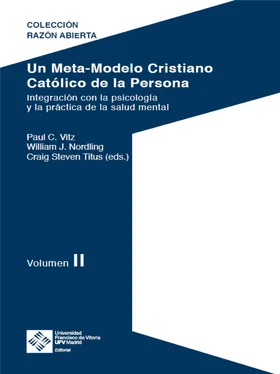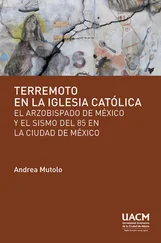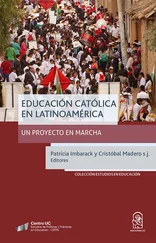Blai, A. C. (2017). Possession, exorcism and hauntings . Steubenville, OH: Emmaus.
Brennan, R. E. (1941). Modern psychology and man. The Thomist: A Speculative Quarterly Review, 3 (1), 8-32.
Brizendine, L. (2007). The female brain . New York, NY: Broadway Books.
— (2010). The male brain: A breakthrough understanding of how men and boys think . New York, NY: Three Rivers Press.
Catechism of the Catholic Church ( CCC ) (2.ª ed.). (2000). Vatican City, Vatican: Libreria Editrice Vaticana.
Cessario, R. (2001). Introduction to moral theology . Washington, DC: The Catholic University of America Press.
Cessario, R. (2002). The virtues, or the examined life . New York, NY: Continuum International Publishing.
Damasio, A. R. (1994). Descartes’ error: Emotion, reason, and the human brain . New York, NY: Putman.
Descartes, R. (1989). The passions of the soul (S. Voss, Trad.). Indianapolis, IN: Hackett. (Obra original compuesta en 1649).
DeYoung, R. K., McCluskey, C., & Van Dyke, C. (2009). Aquinas’s ethics: Metaphysical foundations, moral theory, and theological context . Notre Dame, IN: University of Notre Dame Press.
Dickens, C. (1989). A tale of two cities . New York, NY: Bantam Classics. (Obra original publicada en 1859).
Dixon, T. (2003). From passions to emotions: The creation of a secular psychological category . Cambridge, United Kingdom: Cambridge University Press.
Doidge, N. (2007). The brain that changes itself: Stories of personal trimuph from the frontiers of brain science . New York, NY: Penguin Books.
Ekman, P. (1992). An argument for basic emotions. Cognition and Emotion, 6 , 169-200.
Elliott, M. A. (2006). Faithful feelings: Rethinking emotion in the New Testament . Grand Rapids, MI: Kregel Publications.
Ellis, A. (2004). The road to tolerance: The philosophy of rational emotive behavior therapy . New York, NY: Prometheus Books.
Evans, D. (2001). Emotion: The science of sentiment . Oxford, United Kingdom: Oxford University Press.
Evans, D., & Cruse, P. (Eds.). (2004). Emotion, evolution, and rationality . Oxford, United Kingdom: Oxford University Press.
Frankl, V. E. (1959). Man’s search for meaning . New York, NY: Washington Square Press.
Frijda, N. H. (1986). The emotions . Cambridge, United Kingdom: Cambridge University Press.
Fritz-Cates, D. (2009). Aquinas on the emotions: A religious-ethical inquiry . Washington, DC: Georgetown University Press.
Gallagher, T. M. (2005). The discernment of spirits: An Ignatian guide for everyday living . New York, NY: Crossroad.
Gilligan, C. (1982). In a different voice: Psychological theory and women’s development . Cambridge, MA: Havard University Press.
Gondreau, P. (2007). The passions and the moral life: Appreciating the originality of Aquinas. The Thomist, 71 (3), 419-450.
— (2009). The passions of Christ’s soul in the theology of St. Thomas Aquinas . Scranton, PA: University of Scranton Press.
— (2013). Balanced emotions. In R. Cessario, C. S. Titus, & P. C. Vitz (Eds.), Philosophical virtues and psychological strengths: Building the bridge (pp. 139-200). Manchester, NH: Sophia Institute Press.
Goleman, D. (2005). Emotional intelligence: Why it can matter more than IQ (2.ª ed.). New York, NY: Bantam Books.
Greenberg, L. S. (2012). Emotions, the great captains of our lives: Their role in the process of change in psychotherapy. American Psychologist, 67 (8), 697-707.
Greenberg, L. S., & Johnson, S. M. (1988). Emotionally focused therapy for couples . New York, NY: Guilford.
Hartel, J. (1993). Femina ut Imago Dei in the integral feminism of St. Thomas . Rome, Italy: Gregorian and Biblical Press.
Hobbes, T. (1994). Leviathan (E. Curley, Ed.). Indianapolis, IN: Hackett. (Obra original compuesta en 1651).
Hume, D. (2000). A treatise of human nature (D. F. Norton & M. J. Norton, Eds.). New York, NY: Oxford University Press. (Obra original compuesta en 1740).
John of Damascus (1958). An exact exposition of the orthodox faith. In F. H. Chase, Jr. (Trad.), Writings (pp. 165-406). Washington, DC: The Catholic University of America Press. (Obra original compuesta ca. 745).
Kahneman, D. (2011). Thinking, fast and slow . New York, NY: Farrar, Straus and Giroux.
Kant, I. (1996). The metaphysics of morals (M. Gregor, Ed. & Trad.). Cambridge, United Kingdom: Cambridge University Press. (Obra original compuesta 1797).
LeDoux, J. (1998). The emotional brain: The mysterious underpinnings of emotional life . New York, NY: Simon & Schuster.
Lewis, C. S. (1961). A grief observed . New York, NY: HarperCollins.
Lhermitte, J. (2013) True or false possessions? How to distinguish the demonic from the demented . Manchester, NH: Sophia Institute Press.
Linehan, M. M. (1993). Skills training manual for treating borderline personality disorder . New York, NY: Guilford.
Lombardo, N. (2011). The logic of desire: Aquinas on emotion . Washington, DC: The Catholic University of America Press.
Loughlin, S. (2001). Similarities and differences between human and animal emotion in Aquinas’s thought. The Thomist, 65 (1), 45-65.
MacIntyre, A. (2007). After virtue: A study in moral theory (3.ª ed.). Notre Dame, IN: University of Notre Dame Press.
Mattison, W. (2004). Virtuous anger?: From questions of vindicatio to the habituation of emotion. Journal of the Society of Christian Ethics, 24 (1), 159-179.
— (2008). Introducing moral theology: True happiness and the virtues . Grand Rapids, MI: Brazos Press.
Mayer, J. D., & Salovey, P. (1989). Emotional intelligence. Imagination, cognition, and personality, 9 (3), 185-211.
Miner, R. (2009). Thomas Aquinas on the passions: A study of Summa theologiae Ia2ae 22-48 . Cambridge, United Kingdom: Cambridge University Press.
Peterson, C., & Seligman, M. E. P. (2004). Character strengths and virtues: A handbook and classification . New York, NY: Oxford University Press.
Pinckaers, S. (2005). Reappropriating Aquinas’s account of the passions. In J. Berkman and C. Titus (Eds.), The Pinckaers reader: Renewing Thomistic moral theology (pp. 273-287). Washington, DC: The Catholic University of America Press.
Rhoads, S. E. (2004). Taking sex differences seriously . San Francisco, CA: Encounter Books.
Scarantino, A. (2016). The philosophy of emotions and its impact on affective science. En L. F. Barrett, M. Lewis, & J. M. Haviland-Jones (Eds.), Handbook of emotions (4.ª ed., pp. 3-48). New York, NY: Guilford Press.
Sherman, N. (1997). Making a necessity of virtue: Aristotle and Kant on virtue . Cambridge, United Kingdom: Cambridge University Press.
Sherwin, M. S. (2009). Infused virtue and the effects of acquired vice: A test case for the Thomistic theory of infused cardinal virtues. The Thomist, 73 (1), 29-52.
Shields, S. A., & Kappas, A. (Eds). (2006). Magda. B. Arnold’s contributions to emotion research and theory . London, United Kingdom: Psychology Press.
Siegel, D. (2012). Interpersonal neurobiology . New York, NY: Norton.
Sokolowski, R. (1982). The God of faith & reason: Foundations of Christian theology . Washington, DC: The Catholic University of America Press.
Sripada, C., & Stich, S. (2004). Evolution, culture, and the irrationality of emotions. In D. Evans & P. Cruse (Eds.), Emotion, evolution, and rationality (pp. 113-158). Oxford, United Kingdom: Oxford University Press.
Читать дальше












